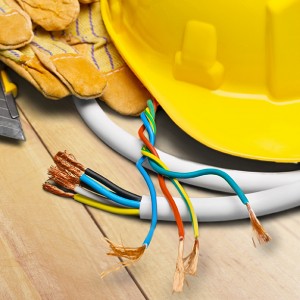 When planning home improvement projects, do you know when to DIY and when to hire a professional? Indiana Electric Cooperatives offers the following tips to help keep you safe.
When planning home improvement projects, do you know when to DIY and when to hire a professional? Indiana Electric Cooperatives offers the following tips to help keep you safe.
Those wanting to do it themselves can tackle many types of projects, but when safety becomes an issue, seek a professional with appropriate equipment, training and insurance. For example, painting your bedroom may be a safe weekend project, but climbing a tall ladder for an exterior paint job can be a safety risk.
To avoid electrocution and fires, Indiana Electric Cooperatives recommends leaving electrical issues to professional contractors. Home rewiring, breaker box replacement, and updating electrical outlets with USB ports are among tasks you should consider leaving for the pros.
Qualified electricians can ensure that your home’s wiring is up to modern safety code standards. They conduct home electrical system inspections that will identify problem areas. These inspections often take place before buying a home or shortly afterward.
“Faulty electrical installations can cause shocks, fires and other dangers that could have been completely avoided if the job had been done properly,” said Tom VanParis, CEO of Indiana Electric Cooperatives.
Your home also might give you hints that you need an electrician’s help. If you feel shocks or tingles from appliances, you may have a ground fault issue. If your ceiling fixtures are warm or lights flicker, that may be a sign of loose wiring. If an outlet emits a burning odor or sparks, shut down the electrical panel right away and call for help. This puts you at risk for a fire.
Do you live in a home built before 1950 with old-fashioned knob and tube wiring? This wiring creates a risk of faults and fires and simply can’t handle the electrical load of modern houses. Replacing this wiring, which was the top choice from the 1880s to the 1930s, typically costs between $8,000 and $15,000 for an average home.
Before you need an electrical contractor, if possible, do some research and choose a skilled electrician. Most homeowners call electricians in emergencies or when they’re building or remodeling. But if you choose a contractor in advance, he or she can inspect your home’s systems regularly and could discover emerging problems before they become major issues.
Source: libertymutual.com, angieslist.com
Tips for choosing an electrical contractor
Before you hire anyone to work on your property, use the following tips to keep your family safe.
DO…
- Request to see proof of an electrical contractor’s license and insurance. If there were an injury on your property, an uninsured contractor could sue you, even if you weren’t directly involved.
- Run a quick check with the Better Business Bureau. The reports will grade your potential contractor, and you can also read complaints that consumers have filed with those businesses.
- Get recommendations from friends and family members. Do you have a friend who is a general contractor? Ask who he or she hires for electrical projects.
- Request a quote up front. Top electrical contractors should be able to give you quotes over the phone for simple jobs or make a no-charge visit to your property for more complex projects.
- Get multiple bids for your project before you hire a contractor. This will give you an idea of the going rate. The bid should detail the work that will be performed, materials needed, a general timeline of completion and payment schedule.
- Ask about the contractor’s warranty. Highly-rated electricians say top contractors will offer a parts and labor warranty to show that they stand behind their work.
DON’T…
- Pull permits for a contractor’s job. An electrician’s unwillingness to obtain permits is often a sign the contractor isn’t licensed.
- Assume all contractors are qualified. Contractors work on important equipment in your home. Don’t risk your family’s safety by assuming a contractor in an ad is reputable.
Source: cableorganizer.com
Different types of electricians
Did you know there are four different types of electricians?
- Residential electricians install, maintain and upgrade electrical equipment in apartments and houses. They can work on outlet improvements, breaker box upgrades and total home rewirings. They can work on construction sites to install wiring and boxes in new homes.
- Commercial electricians work on construction sites, in commercial buildings and on mechanical electrical systems. Commercial electricians also install water heaters, commercial security systems and electronic key systems.
- Journeymen electricians complete several years of on-the-job training and receive a state license to work with mechanical connections, lighting installation, power supplies, security systems and communications in both residences and commercial buildings.
- Master electricians are highly skilled electricians. They generally work in a supervisory role or own their own contracting business.
Source: angieslist.com




